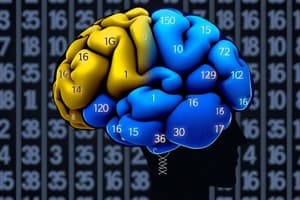Podcast
Questions and Answers
What is the purpose of standardization in intelligence testing?
What is the purpose of standardization in intelligence testing?
- To establish norms against which individual scores are compared (correct)
- To measure the validity of a test's results
- To create various intelligence theories
- To ensure that tests have a high degree of reliability
What does reliability in test construction refer to?
What does reliability in test construction refer to?
- The statistical significance of test scores
- The consistency of test results over repeated administrations (correct)
- The range of intelligence scores in the population
- The test's ability to measure intelligence accurately
Which psychologist proposed the concept of 'G Factor' or General Intelligence?
Which psychologist proposed the concept of 'G Factor' or General Intelligence?
- Charles Spearman (correct)
- Howard Gardner
- Alfred Binet
- Louis L. Thurstone
Which of the following is NOT one of the basic requirements for good test design?
Which of the following is NOT one of the basic requirements for good test design?
According to Howard Gardner, intelligence is best defined as:
According to Howard Gardner, intelligence is best defined as:
The Normal Curve represents:
The Normal Curve represents:
What theorist believed intelligence comprises seven independent abilities?
What theorist believed intelligence comprises seven independent abilities?
What aspect of intelligence testing does validity specifically address?
What aspect of intelligence testing does validity specifically address?
In the field of intelligence testing, which statement reflects a common belief?
In the field of intelligence testing, which statement reflects a common belief?
The Wechsler Intelligence Scale for Children was updated in which year?
The Wechsler Intelligence Scale for Children was updated in which year?
What is the primary focus of the intelligence tests developed by Alfred Binet?
What is the primary focus of the intelligence tests developed by Alfred Binet?
How is mental age defined in the context of intelligence testing?
How is mental age defined in the context of intelligence testing?
What was the name of the intelligence scale that Lewis Terman adapted from Binet's work?
What was the name of the intelligence scale that Lewis Terman adapted from Binet's work?
According to Lewis Terman's research, children with an IQ above 140 generally exhibited which characteristic?
According to Lewis Terman's research, children with an IQ above 140 generally exhibited which characteristic?
What aspect of intelligence did David Wechsler emphasize in his understanding of IQ scores?
What aspect of intelligence did David Wechsler emphasize in his understanding of IQ scores?
What is the primary structure of the Wechsler Intelligence Scale for adults?
What is the primary structure of the Wechsler Intelligence Scale for adults?
What do IQ scores predominantly predict, according to the findings regarding high IQ children?
What do IQ scores predominantly predict, according to the findings regarding high IQ children?
Which of the following does NOT reflect David Wechsler's belief about intelligence?
Which of the following does NOT reflect David Wechsler's belief about intelligence?
What is the purpose of the performance score in the Wechsler intelligence test?
What is the purpose of the performance score in the Wechsler intelligence test?
Which of the following is a characteristic feature of the Stanford-Binet test?
Which of the following is a characteristic feature of the Stanford-Binet test?
Flashcards
Intelligence (Wechsler's definition)
Intelligence (Wechsler's definition)
The capacity to think rationally, act purposefully, and deal effectively with the environment.
Binet-Simon Intelligence Test
Binet-Simon Intelligence Test
A series of tests designed to assess different mental abilities, such as memory, attention, and problem-solving.
Mental age
Mental age
A measurement of intelligence that expresses an individual's mental level in terms of the average abilities of a specific age group.
Stanford-Binet Intelligence Scale
Stanford-Binet Intelligence Scale
Signup and view all the flashcards
Intelligence Quotient (IQ)
Intelligence Quotient (IQ)
Signup and view all the flashcards
Terman's Gifted Children Study
Terman's Gifted Children Study
Signup and view all the flashcards
Does high IQ predict success?
Does high IQ predict success?
Signup and view all the flashcards
Wechsler's view of intelligence
Wechsler's view of intelligence
Signup and view all the flashcards
Wechsler Intelligence Scale
Wechsler Intelligence Scale
Signup and view all the flashcards
Verbal score
Verbal score
Signup and view all the flashcards
Performance Score
Performance Score
Signup and view all the flashcards
Standardization
Standardization
Signup and view all the flashcards
Reliability
Reliability
Signup and view all the flashcards
Validity
Validity
Signup and view all the flashcards
Normal Curve
Normal Curve
Signup and view all the flashcards
Normal Curve of Distribution of IQ
Normal Curve of Distribution of IQ
Signup and view all the flashcards
Reliability
Reliability
Signup and view all the flashcards
Validity
Validity
Signup and view all the flashcards
G Factor
G Factor
Signup and view all the flashcards
Study Notes
Intelligence Defined
- David Wechsler defined intelligence as the overall capacity to think rationally, act purposefully, and effectively interact with the environment.
Development of Intelligence Tests
- Alfred Binet, with Theodore Simon, developed procedures to identify students needing extra support.
- They created tests measuring various mental skills, focusing on fundamental abilities like memory, attention, and recognizing similarities/differences.
Mental Age
- Binet's work introduced the concept of mental age, which differs from a child's chronological age.
- Mental age is a measure of intelligence, expressing an individual's mental level based on the average abilities of their age group.
Stanford-Binet Intelligence Scale
- Lewis Terman adapted Binet's test, naming it the Stanford-Binet intelligence scale.
- Scores are expressed as an Intelligence Quotient (IQ).
Intelligence Quotient (IQ)
- IQ is a measure of overall intelligence, calculated by comparing an individual's score to the average score of others in the same group.
High IQ and Success
- Lewis Terman's longitudinal study of children with high IQs (above 140) showed they tended to be well-adjusted socially.
- These children also exhibited taller, stronger, and healthier features than average children.
- However, high intelligence doesn't guarantee success; other factors play a role in life achievements beyond school success.
Wechsler's Perspective
- David Wechsler (1896-1981) believed intelligence involved many mental skills.
- He also thought IQ scores could be affected by personality, motivation, and cultural variables.
- He developed the Wechsler Intelligence Scale for adults.
Wechsler Intelligence Scale
- Intended specifically for adults, rather than children.
- Includes 11 subtests covering various abilities.
- Subtest scores are gathered to create an overall verbal score, and performance score.
Wechsler Verbal Skills
- Vocabulary
- Comprehension
- Knowledge of general information
- Other verbal tasks
Wechsler Performance Skills
- Identifying missing components in incomplete pictures.
- Arranging pictures to tell stories.
- Arranging blocks to follow given patterns.
Wechsler Intelligence Scale for Children
- The Wechsler Intelligence Scale for Children (WISC-III) designed in 1991 measures intelligence in children from 6 to 16 years.
- The WISC-IV is the revised version of 2003.
Intelligence Test Principles
- Three essential elements of reliable tests:
- Standardization : The test is given to a large, representative sample of people under uniform conditions to generate norms against which individual scores are interpreted. IQ test norms follow a normal curve or normal distribution.
- Reliability: The ability of a test to give consistent results under the same conditions when administered repeatedly.
- Validity: The ability of a test to measure what it is intended to measure.
The Normal Curve (Normal Distribution)
- The bell-shaped normal distribution illustrates how most scores cluster around average in a typical population.
- IQ scores generally follow a normal curve, indicating similar clusters among the scores in a population.
Nature of Intelligence
- Psychologists disagree on the essential nature of intelligence, including whether it's a single, general ability or if it incorporates talents, skills, and mental aptitude.
Theories of Intelligence
- Charles Spearman: Proposed "general intelligence" (g factor) underpinning overall mental ability.
- Louis Thurstone: Believed intelligence comprises several distinct, independent "primary mental abilities".
- Howard Gardner: Argued for "multiple intelligences", each relevant within different cultural settings.
- Robert Sternberg: Described analytic, creative, and practical intelligence.
Roles of Genetics and Environment
- Both genetics and the environment influence intelligence.
- Twin studies demonstrate a strong genetic influence, suggesting identical twins raised together have highly correlated IQ scores, and those raised apart have slightly less similar IQs.
Studying That Suits You
Use AI to generate personalized quizzes and flashcards to suit your learning preferences.




